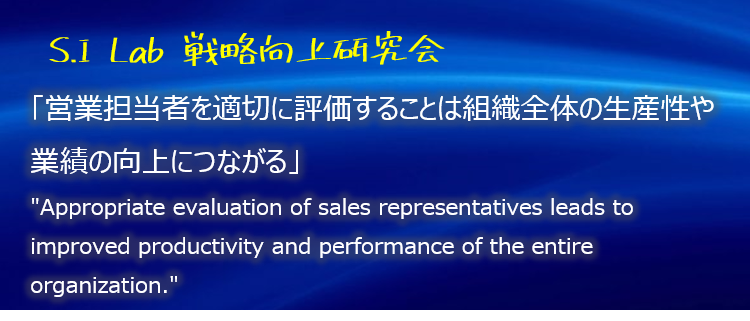評価の指標が不明確で、業績に結びつかない指標が設定されていると営業担当者は仕事の意義や向かうべき方向性を見失ってしまいます。
市場環境の多様化から、営業担当者を単純に売上実績だけで評価することは不公平感を生みます。
そのような場合には、売上実績だけで測定する代わりに、活動プロモーションにおける努力を評価するプロセスの順守に重点を置くようになります。
活動プロモーションにおける努力による評価を行うには活動量を数値化したKPIが用いられます。
定められたKPIから逸脱することは、その努力を測定したり正当化したりすることが困難になるため許容されません。
しかしKPI至上主義は営業担当者の問題に適応する力を失わせ、環境変化への対応が抑制されてしまいます。
市場環境の異なる営業担当者を、営業活動のゴールである売上実績で評価する定量的な評価基準が必要です。
マトリクス分析法を用いればロイヤルカスタマーの維持率や強化顧客のランクアップなど、KGIとKPIをつなぐKRIを設定することが出来ます。
“Appropriate evaluation of sales representatives leads to improved productivity and performance of the entire organization.”
If evaluation indicators are unclear and indicators that are not linked to performance are set, sales representatives will lose sight of the significance of their work and the direction they should take.
Due to the diversification of the market environment, it creates a sense of unfairness to evaluate sales representatives simply based on their sales performance.
In such cases, the emphasis will be on adhering to a process that evaluates efforts in activity promotion, instead of just measuring sales performance.
KPI, which quantifies the amount of activity, is used to evaluate efforts in activity promotion.
Deviating from the defined KPIs is unacceptable as it makes the effort difficult to measure and justify.
However, KPI supremacy makes sales representatives lose their ability to adapt to problems, and their ability to respond to changes in the environment is suppressed.
You need a quantitative evaluation standard that evaluates sales representatives in different market environments based on sales performance, which is the goal of sales activities.
Using the matrix analysis method, it is possible to set KRIs that connect KGIs and KPIs, such as the retention rate of loyal customers and the rank-up of loyal customers.

